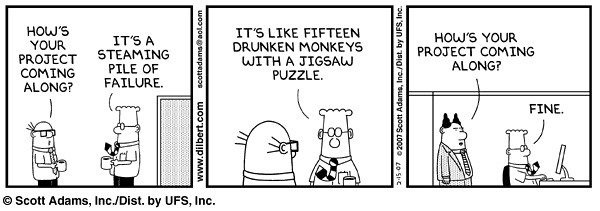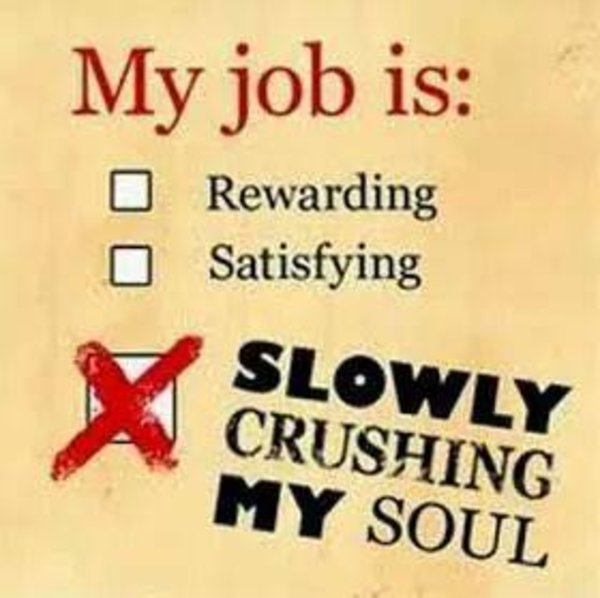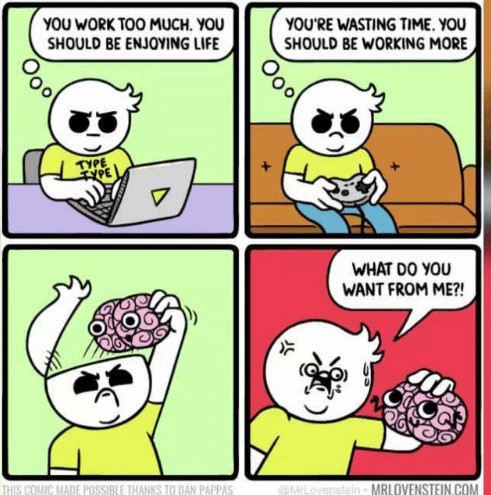Most of us will experience our jobs as a type of torture. Despite the fact that an entire industry exists to provide motivational posters, badges, and plaques to inspire workers, none of it makes a difference, we continue to hate work.
But Why?
Here is an explanation as to why your job sucks and your projects are late.
We’ll use as an example a small, almost fictitious team tasked with creating a new app. First, we’ll get to know the team members.
Tim – He thinks of himself as being a hard-driving, fully focused visionary leader. Tim doesn’t care if a few feelings get hurt as long as the project is on time and under budget. He swears to investors that everything is going perfectly. His subordinates think he’s a dick, which is no surprise.
He keeps a copy of “Make It So – Leadership Lessons From Star Trek The Next Generation” on his desk.
Katrina – As an ex-military officer, she knows the value of accomplishing the mission or at least appearing to do things as ordered. Despite 15 years of service, she was never promoted above corporal. Her pride and joy is her 5-year-old daughter. Katrina has a well-worn copy of “Getting Things Done” on her nightstand.
Jamar – His mother teaches high-school chemistry while his father teaches art at the state university. The joke is that to spite them both, he majored in Computer Science. Jamar preserves his introverted wall by keeping earphones on all day and listening to “Deep Work” by Cal Newport.
Dale – Dedicated to one thing, being a slacker. Truthfully, if it weren’t for family ties, Dale would not be here.
The Achetypes
Do you recognize any of these people? If not, do you recognize any of their inherent qualities?
Tim – Much talk but little understanding of how things are done and how much time it takes to get it done. It really is about how the projects look on his resume or whether it wins the next promotion.
Katrina – Good is good enough + she has another primary interest, her child.
Jamar – His belief in the craftsmanship of his code almost hides his perfectionist tendencies.
Dale – No explanation necessary.
The Difference Between Being Put in Charge and Being in Control
As those of us who’ve been in the world of work for some time know, there’s a difference between being put in charge and being in control.
“Put in charge” means that a decision-maker outside of the group has selected someone to lead. “In control” is the person that directs the group’s efforts.
Let’s examine how things go when different people are in control of this project.
Tim in control
Meetings upon meetings, emails at all hours, and a constant supply of the latest corporate buzzwords. If you’ve ever worked with a Tim you know that there are unrealistic timelines, a budget that varies between enough money to build a starship or not enough to draw a doghouse.
With Tim the project is not ‘late’ it’s that he made the time allocation with ignorance or in corporate speak, it’s “Overly Ambitious”. Therefore, pressure is the name of the game. Emotional burnout is a result for everyone except Tim.
Working with someone like Tim means that what you earn barely compensates for the mental wreck you’ll become.
Katrina in control
– The product works and is delivered on time. No bells, no whistles, no-frills. Could it be better? Sure, maybe in an update. Does it need to be hyped to be the next ‘big thing’? If it does, leave that up to Tim.
Discussions of a expansive theoretical nature are cut short even if they might lead to improvements.
I’ve worked with several ‘Katrinas’ and they have tended to show concern for their team’s well-being BUT don’t get confused. Any suggestions leading to delay are put in the trash bin of Katrina’s mind.
Jamar in control
Will the app have everything that the client/customer could ever want and a few things more? Definitely. Will it be delivered on time?
Hell No!
Perfectionists know that perfection takes time and that those who want perfection will be willing to wait.
This is a fallacy. Perfection takes practice. Regular practice teaches us how to spot and eliminate mistakes, so the next iteration will be better than the last.
Perfectionists tend to be driven more by a fear of failure than a need to get it right. This tendency shows itself as endless new additions to the project or delays bordering on sabotage.
I once stumbled upon a project (creating an organizational policy document) that had been delayed for 20 FREAKING YEARS by a team of Jamars lead by an Ultra Jamar. If you’ve never been invited to socialize after work with your colleagues, you might be a Jamar.
Dale in control
Being assigned to work with Dale is a type of punishment/exile. Dales are to be avoided unless you are a like-minded slacker. Sometimes a team led by a Dale will get wonderful things done but only when Dale has the sense to stay out of the way.
Explanation of The Sucky Part

To quote Jean – Paul Satre, “Hell is other people”.
The interplay of personality, ideals, and work ethic goes a long way to ensuring that we’ll have problems on the job. This example looks at a small team in one location. What happens in a multi-national? What happens when the trolls in the corporate office decide on some new policy regulation because their lives have no meaning? What happens when the client’s specifications change on a weekly basis?
Usually it means that the stress of work becomes even worse.
Thank Goodness I’m Self-Employed or Have Total Autonomy
What if you work for yourself in an entrepreneurial venture. Does this mean that all is well?
No.
Look at your personal projects, hobbies, and goals. Is everything moving forward as envisioned?
Probably not.
In some things, you are setting Tim-like improbable time constraints.
In others, you are Jamar, stuck in analysis paralysis and promising to get started when everything is just right.
Your inner Katrina plans to focus and grit her teeth but Dale is re-playing Candy Crush.
Conclusion
Despite the blathering nonsense of ‘finding your passion’ the majority of people work as a necessity. Even when we love doing something there will be the interplay of personalities and conflicting motivations that cause us some level of grief.
Do you agree or is your experience truly different than the example given? Let me know in the Comment Section.




Speak Your Mind